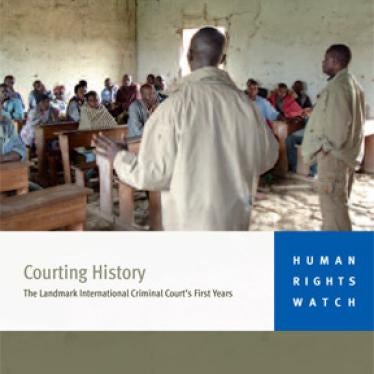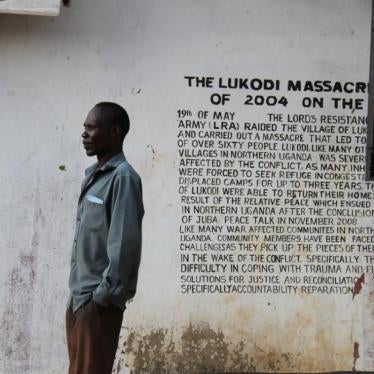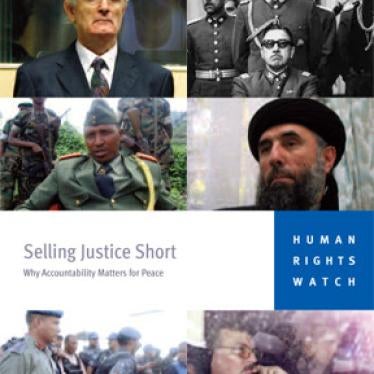(The Hague) - The International Criminal Court (ICC) has made notable progress in bringing justice for the worst crimes despite mistakes in policy and practice, Human Rights Watch said in a report released today that assesses the court’s first five years. Human Rights Watch urged greater international support of the ICC to meet the political and financial challenges ahead.
The 244-page report, “Courting History: The Landmark International Criminal Court’s First Years,” examines the ICC’s accomplishments and shortcomings since it began operations in 2003. The court was created to bring justice to the victims of gross human rights violations; so far the court has issued arrest warrants against suspects in four countries, though none have yet been tried.
“The International Criminal Court has made real headway in bringing justice to the victims of horrible abuses in the face of daunting obstacles,” said Richard Dicker, International Justice Program director at Human Rights Watch. “But the court should tackle real shortcomings so that its work resonates in the communities most affected by major international crimes.”
In addition to progress in investigations, Human Rights Watch identified the court’s viable witness protection programs and efforts to provide meaningful support to defendants and to implement a complicated system of victims’ participation in proceedings as illustrations of the court’s achievements to date.
Human Rights Watch also found that in establishing an unprecedented judicial institution, ICC officials have made mistakes. Recently, the trial chamber suspended the trial of Thomas Lubanga, a Congolese warlord accused of enlisting, recruiting, and using children as soldiers, because of the prosecutor’s inability to turn over potentially exculpatory information to the court. Other shortcomings include the court’s slowly evolving approach to outreach and certain problematic investigative policies of the prosecutor. The report makes recommendations to address these and other concerns.
Human Rights Watch’s field work with members of affected communities in the Democratic Republic of Congo, northern Uganda, and eastern Chad revealed many issues and perceptions about the ICC’s work among these communities. In some instances, such as in Congo, there is legitimate criticism of the prosecutor’s strategy for selecting cases.
“Moving forward, we look to court officials to learn from their slow start and to improve their interaction and engagement with communities most affected by the crimes in the court’s jurisdiction,” said Dicker. “These are, after all, the communities that the ICC was created to serve.”
July 17, 2008 marks the 10-year anniversary of the Rome Statute establishing the International Criminal Court in The Hague. Human Rights Watch emphasized that the international community should provide the ICC with the diplomatic support it needs, including enforcing its arrest warrants. The group also emphasized the need for states parties to continue to provide the court with the necessary financial support.
“Ten years ago, 120 states made a pledge that victims of the worst atrocities could find justice at the world’s first-ever permanent criminal court,” said Dicker. “It is now up to the court’s states parties and to the UN to throw their weight behind the court so that it can meet the challenges ahead.”
Background
The ICC prosecutor has opened investigations in the Democratic Republic of Congo, northern Uganda, the Darfur region of Sudan, and the Central African Republic. Based on those investigations, 12 arrest warrants have been issued.
To date, four of these defendants are in ICC custody in The Hague, including Jean-Pierre Bemba, former vice-president of the Congo, in relation to alleged crimes committed in the Central African Republic.
The ICC’s trial against Thomas Lubanga – the first trial in the court’s history – was scheduled to begin in June 2008 but has been suspended indefinitely because of the prosecution’s inability to disclose exculpatory information to the court and because of the trial chamber’s concerns that he would not receive a fair trial as a result.







